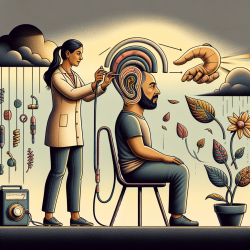Introduction
The journey of postlingually deaf individuals adapting to cochlear implants (CIs) is not only a medical intervention but also a profound psychological transformation. The recent study, "Posttraumatic Growth in Postlingually Deaf Patients With Cochlear Implants: The Effect of Stress-Coping Strategies, Sociodemographics, and Deafness-Related Factors," sheds light on the potential for posttraumatic growth (PTG) in these individuals. This blog explores the study's findings and offers insights for practitioners aiming to enhance their therapeutic approaches.
Understanding Posttraumatic Growth
Posttraumatic growth refers to the positive psychological changes that occur as a result of struggling with challenging life circumstances. For postlingually deaf individuals, the transition to using a cochlear implant can be a seismic event, potentially leading to PTG. The study involved 119 participants who completed questionnaires assessing PTG, coping strategies, and personal demographics.
Key Findings
- Positive Correlation with Time: The study found that both the duration since hearing loss and the length of CI use positively correlated with PTG. This suggests that time plays a crucial role in adapting and finding growth after trauma.
- Coping Strategies: Both approach-oriented (e.g., active coping, planning) and avoidance-oriented strategies (e.g., denial, self-distraction) were linked to PTG. Interestingly, avoidance strategies, often seen as negative, may provide a protective function, fostering PTG.
- Gender Differences: Women were more likely to use emotional and instrumental support, which correlated with higher PTG levels. This highlights the importance of tailored interventions that consider gender-specific coping mechanisms.
Implications for Practitioners
Practitioners can leverage these findings to enhance therapeutic outcomes for postlingually deaf CI users. Here are some strategies:
- Encourage Diverse Coping Strategies: Facilitate both approach and avoidance coping strategies, recognizing their potential to foster PTG.
- Support Over Time: Acknowledge the role of time in healing and growth, providing long-term support and interventions.
- Gender-Sensitive Approaches: Develop gender-specific interventions that address the unique coping mechanisms of men and women.
Conclusion
The study underscores the potential for posttraumatic growth in postlingually deaf individuals using cochlear implants. By understanding and supporting the diverse coping strategies these individuals employ, practitioners can enhance therapeutic outcomes and facilitate meaningful growth. For a deeper dive into the research, read the original research paper.










